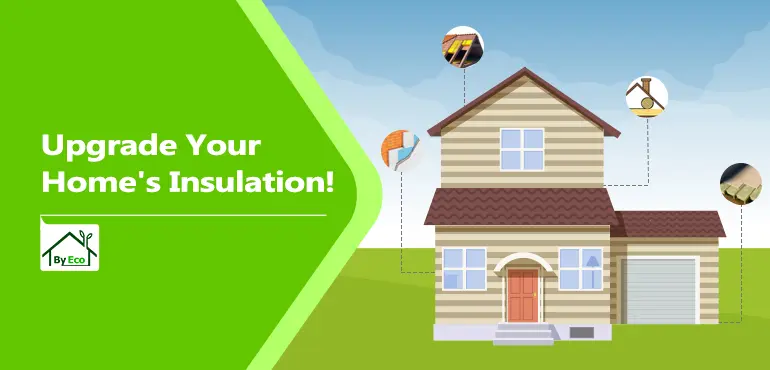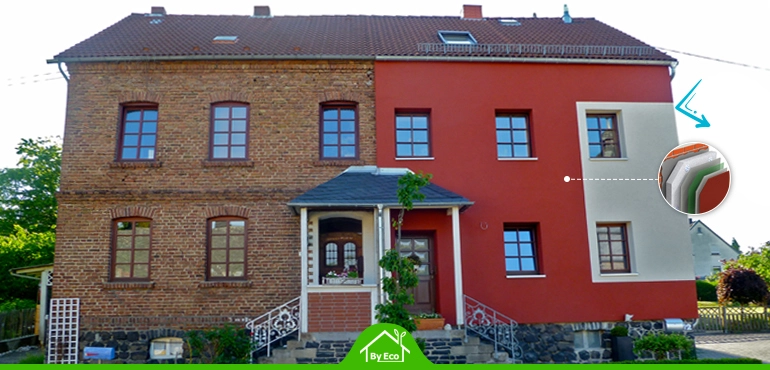Insulation in UK Homes: Enhancing Comfort and Efficiency

In the quest to make homes more energy-efficient and comfortable, insulation is key. As energy prices rise and environmental awareness grows, it’s increasingly important to understand and use effective insulation methods.
This article goes beyond basic insulation guidance to explore advanced materials, innovative technologies, and strategies for both retrofitting and new constructions. Aimed at helping homeowners make informed decisions, this guide enhances energy performance and supports a greener future.
Retrofitting Homes with Modern Insulation
Retrofitting existing homes with modern insulation can be challenging but offers significant benefits:
Exterior Insulation Finishing System (EIFS): Also known as external thermal insulation composite systems, EIFS can be applied over existing walls without removing the interior finishes, providing a fresh exterior look and enhanced insulation.

Injection Foam: Used for cavity walls, injection foam fills existing empty spaces in walls without the need for extensive renovation, making it ideal for upgrading older homes that lack adequate insulation.
Internal Wall Insulation: For homes where changing the exterior is not possible, adding insulation internally can be a viable option, though it does slightly reduce the living space.
Tackling Common Challenges in Home Insulation
-
Overcoming Condensation and Moisture Issues:
Proper insulation reduces the risk of condensation by maintaining higher interior surface temperatures. Ventilation systems, such as passive vents or active heat recovery ventilators, can help manage moisture levels, ensuring that homes remain healthy and dry.
-
Insulating Unusual and Difficult Spaces:
Areas like basements, attics, and garages pose unique challenges due to their susceptibility to temperature extremes and moisture. Choosing the right insulation, such as closed-cell spray foam for basements that can handle moisture exposure, or reflective insulation in attics to combat heat from the roof, can optimise these spaces for better utility and comfort.
-
Achieving Thermal Bridging Mitigation:
Thermal bridging occurs when materials that are poor insulators come in contact, allowing heat to bypass the insulation. To mitigate this, installing continuous insulation across all structural elements or using thermal break materials can prevent heat loss, enhancing the overall effectiveness of the insulation.
Innovations in Insulation Installation Techniques
-
Spray Foam Innovations:
Modern spray foams are more eco-friendly, with options that use water or environmentally benign blowing agents. These materials not only provide excellent air sealing and insulation but also contribute to the home's structural strength.
-
Hybrid Insulation Systems:
Combining different types of insulation materials can maximise energy efficiency. For instance, pairing rigid foam boards with loose-fill cellulose creates a system that boasts the air sealing properties of foam with the economical and eco-friendly benefits of cellulose.
-
Smart Installation Practices:
Using infrared imaging and other diagnostic tools during installation can ensure that insulation covers all potential weak points in a building’s envelope. This technology-guided approach ensures optimal placement and performance of insulation materials.
Navigating Insulation Standards and Regulations
-
Complying with Building Regulations:
UK building regulations continuously evolve to increase energy efficiency standards. Staying informed about these changes is crucial for compliance and to maximise the benefits of home insulation projects.
-
Utilising Government Schemes:
Schemes like the ECO4 and the GBIS provide funding to support insulation upgrades. These initiatives not only reduce the upfront costs associated with insulating homes but also promote long-term sustainability.
-
3. Certification and Quality Assurance:
Choosing insulation materials and services that meet industry standards and are certified by bodies like the British Board of Agrément (BBA) ensures that insulation is safe, effective, and a worthwhile investment.
Insulation Grants in the UK
If you're aiming to cut costs on home insulation, leveraging government grants can significantly reduce expenses. The UK offers several programs, such as the Great British Insulation Scheme (GBIS) and the Energy Company Obligation (ECO4), which provide grants to eligible homeowners for free or reduced-cost insulation installations. These initiatives make upgrading your home's energy efficiency more accessible and affordable.
The Great British Insulation Scheme (GBIS)
Launched in April 2023 and running until March 2026, the GBIS seeks to provide cost-effective insulation solutions to a wide array of UK households. This scheme plays a crucial role in broadening access to insulation and accelerating the adoption of energy efficiency measures across the country.
The Energy Company Obligation (ECO4)
Active through March 2026, ECO4 focuses on enhancing insulation and heating systems within UK homes, particularly supporting low-income, fuel-poor, and vulnerable households. This program helps facilitate the implementation of energy-saving upgrades, such as cavity wall, loft, and underfloor insulation, contributing to reduced energy costs and emissions while improving the warmth and comfort of homes.
Check Your Eligibility for Free Insulation Upgradess
Find out if you qualify for complimentary insulation services through schemes like the ECO4 or GBIS by completing our quick eligibility form. Our partnership with the government ensures that homes meeting the criteria can receive necessary insulation upgrades at no cost or for a significantly reduced price. Don’t miss the opportunity to enhance your home’s energy efficiency and comfort. Check your eligibility today!
Personalised Insulation Assessments
1.Comprehensive Home Assessments:
ByEco specialises in conducting detailed home assessments, crucial for pinpointing the ideal energy solution tailored to each homeowner's specific needs. Whether eligible for government support through schemes like ECO4 and GBIS or opting for self-funded upgrades, our approach remains consistent—thorough and customer-focused.
-
For Government Scheme Beneficiaries: For households qualifying for insulation funding, ByEco coordinates every step, from the initial energy audit to the final installation, ensuring that all work complies with government standards and maximises energy efficiency gains.
-
For Non-Eligible Households: Homeowners not qualifying for subsidies receive the same level of attention and expertise, ensuring that their investment in insulation is perfectly suited to their property’s specific requirements. These assessments focus on achieving the best value and maximum energy savings, providing a clear outline of costs and expected energy improvements.
2. Tailored Solutions for Every Home:
Every home is unique, and so are its energy needs. ByEco’s insulation solutions are customised based on the assessment findings—be it selecting the right type of insulation material or determining the most effective installation method. We offer a variety of insulation options, including:
-
Sector-Specific Solutions: Whether it’s a Victorian terrace needing internal wall insulation or a modern detached home requiring advanced aerogel materials for minimal thickness, we tailor our solutions to match the architectural demands and homeowner preferences.
-
Integration with Renewable Energy Systems: We also specialise in integrating insulation upgrades with renewable energy systems like solar panels or heat pumps, creating a holistic energy-efficient home environment.
The Installation Process: Seamless and Professional
-
Scheduling and Execution:
We pride ourselves on a seamless installation process, scheduled at your convenience. Our certified installers are respectful of your space, ensuring minimal disruption to your daily life. The installation is swift and efficient, adhering to the highest standards of quality and safety.
-
Post-Installation Support and Guidance:
After installation, ByEco provides comprehensive post-installation support. This includes a detailed review of the insulation performance and tips on maintaining optimal energy efficiency. Homeowners are equipped with knowledge on how to best utilise their new insulation, ensuring prolonged benefits.
Long-Term Benefits and Sustainability
-
Enhanced Comfort and Reduced Energy Bills:
The immediate benefit of upgrading home insulation is the enhanced comfort throughout the seasons and significantly reduced energy bills. Our solutions are designed to pay for themselves over time through savings in heating and cooling costs.
-
Contribution to Environmental Sustainability:
By improving home insulation, you’re not only saving money but also contributing to a greener planet. Enhanced insulation leads to reduced energy consumption and lower carbon emissions, aligning with global efforts to combat climate change.
-
Increased Property Value:
Well-insulated homes are increasingly sought after in the real estate market. Prospective buyers value the lower energy costs and improved comfort, often resulting in higher property values.
Enhanced Living Conditions and Environmental Responsibility
Living in a well-insulated home isn't just about comfort—it's about creating a sustainable future. ByEco not only enhances the living spaces of UK homes but also contributes to the broader goal of environmental responsibility.
Noise Reduction and Privacy
Insulation plays a critical role in reducing noise pollution, creating a quieter and more peaceful home environment. Whether it's from busy streets or noisy neighbours, our solutions effectively dampen unwanted sounds, enhancing the privacy and tranquillity of your living spaces.
Maintaining Indoor Air Quality
Our insulation techniques also help maintain and improve indoor air quality by preventing the ingress of external pollutants and allergens. This contributes to healthier living environments, especially beneficial for those with allergies or respiratory issues.
Technical Support and Warranty
We stand by the quality of our work with comprehensive technical support and a robust warranty program. Each installation comes with detailed documentation and support, ensuring you can rely on our solutions for years to come.
Seamless Process from Start to Finish
Our process is designed to be as seamless and non-intrusive as possible:
- Initial Consultation: During the initial consultation, we discuss your needs, evaluate your home's current insulation, and propose tailored solutions.
- Detailed Planning: Our team provides detailed plans and visuals to help you understand how the insulation will be implemented and what changes to expect.
- Efficient Installation: We ensure that the installation process is quick, clean, and efficient, minimising disruption to your daily routine.
- Follow-Up: After installation, we conduct a thorough follow-up to ensure the insulation performs as expected and to address any concerns you might have.
